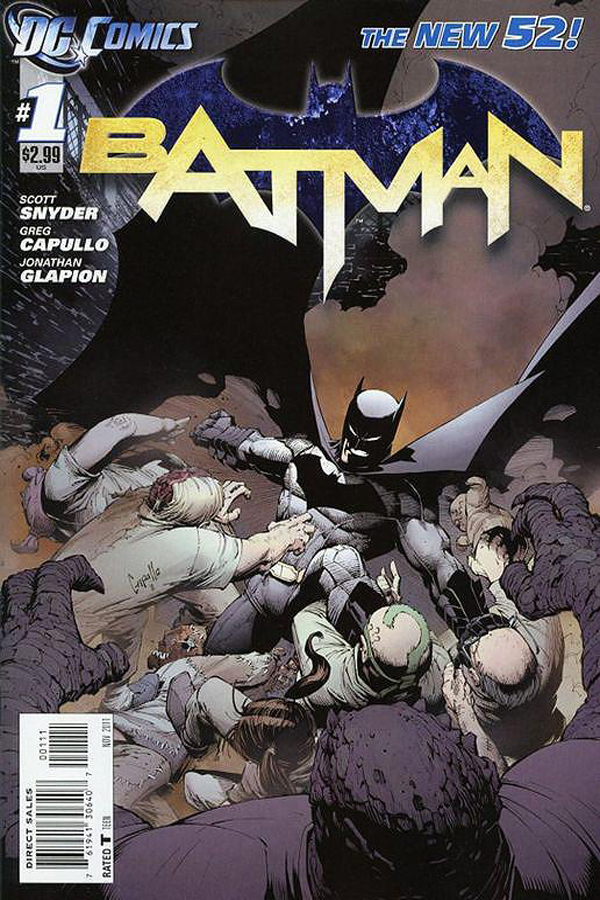 By now, if you’re a movie critic, you’ve filed your Avengers — sorry, Marvel’s The Avengers — review and are girding your loins for The Amazing Spider-Man and The Dark Knight Rises. Before you hold forth on the evils of comic book movies, or write an essay about superhero decadence, let me offer a few suggestions for reviewing Spider-Man and The Dark Knight. These tips won’t guarantee that every DC or Marvel man will be wowed by your references to Rio Bravo and Yojimbo, or swayed by your measured criticisms, but they will ensure that movie-goers like me — smart folk who like Lawrence of Arabia and The Walking Dead — won’t roll our eyes in disgust at yet another review that begins, “Hollywood must be out of ideas, because they sure do like to make comic book movies.”
By now, if you’re a movie critic, you’ve filed your Avengers — sorry, Marvel’s The Avengers — review and are girding your loins for The Amazing Spider-Man and The Dark Knight Rises. Before you hold forth on the evils of comic book movies, or write an essay about superhero decadence, let me offer a few suggestions for reviewing Spider-Man and The Dark Knight. These tips won’t guarantee that every DC or Marvel man will be wowed by your references to Rio Bravo and Yojimbo, or swayed by your measured criticisms, but they will ensure that movie-goers like me — smart folk who like Lawrence of Arabia and The Walking Dead — won’t roll our eyes in disgust at yet another review that begins, “Hollywood must be out of ideas, because they sure do like to make comic book movies.”
1. Don’t trot out the “superheroes are for kids” line.
Neither DC Comics nor Marvel have been publishing superhero comics for kids since the mid-1980s. OK — that’s not entirely true. In the interest of reaching out to younger readers, both companies have created all-ages versions of Batman, Spider-Man, and other popular stories. That both companies felt the need to create kid-friendly versions of these properties ought to tell you something about the content of most DC and Marvel products. Just compare an issue of any New 52 title with Tiny Titans if you don’t believe me; the difference in tone, presentation, and content will astonish you:
It’s fair to criticize the plot of a comic book movie as being too obvious or simplistic to sustain an adult’s interest, of course, but that’s not the same thing as dismissing the entire enterprise as “kids’ stuff” because ten-year-old boys used to be Stan Lee’s target audience. Comics have evolved. So should your critique of movies based on comics.
2. Get your facts straight.
Take it from a comic book reviewer: if you whiff a detail — no matter how insignificant — fans will stop following your argument and start building a case against you. Amy Nicholson — who wrote a smart, informed review of The Avengers — was eviscerated by fans who fumed that she’d referred to Samuel L. Jackson’s character as “Nick Frost” instead of “Nick Fury.” (The error has since been corrected.)
As someone who reviews Japanese comics in translation, I have deep sympathy for this reviewer. I’ve made similar mistakes, and have endured withering comments from readers who think it a cardinal sin to credit the wrong publisher for a book, or misspell a secondary character’s name. What I’ve learned from that experience is that you might demonstrate your erudition in ten other ways — through the quality of your insights, the depth of your cinematic knowledge, or the creativity of your language — but comics fans won’t give a damn about your opinion if you call Captain America “Stephen Rodgers.”
3. Do your homework.
The best comic-book films work equally well for devoted fans and newcomers alike: think Ghost World (2001), Spider-Man (2002), or Superman (1978), all of which had something to offer both groups of viewers. And while it’s beneficial to share your impression of a comic book movie as a member of the general public — as someone who knows Batman from the campy Adam West show, for example, or from watching Saturday morning cartoons — your review will be more authoritative if you take the time to learn a little more about the characters’ histories. Think about it this way: you wouldn’t review a big-screen adaptation of Sense and Sensibility without reading the novel or watching other versions, so why would you walk into a movie version of a long-running comic book franchise without at least familiarizing yourself with the characters? Read Wikipedia. Visit your local comic book store and talk to the sales clerks. Buy a few trades. It won’t kill you, I promise.
4. Remember that there are many comic book fans who will appreciate a thoughtful review.
We aren’t all rampaging monsters with a taste for critics’ flesh; many of us like an elegant turn of phrase or appreciate a Truffaut reference as much as you do. Don’t insult us for liking comic books, and we won’t sneer at you for suggesting The Avengers was overly long. Scout’s honor.





